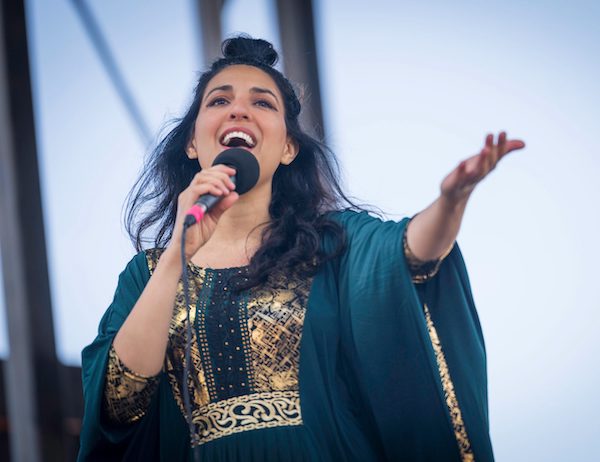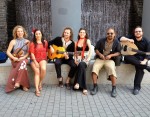Nani Noam Vazana performs at the Rothstein Theatre Nov. 11 as part of this year’s Chutzpah! Festival. (photo from NaniMusic.com/ProLadino)
Gracing the cover of this year’s Chutzpah! Festival guide and posters is Nani Noam Vazana. The Amsterdam-based musician is one of the only artists in the world writing and performing new songs in Ladino, or Judeo-Spanish. The JI spoke with her when she last came to Vancouver, in 2017, and did so again, ahead of her Nov. 11 Chutzpah! show at the Rothstein Theatre.
“The concert in Vancouver is a part of my international Ke Haber tour that will take me through 15 countries,” said Vazana. One of the highlights of the tour will be a concert at the Library of Congress in Washington, DC, she said, “where I’ll have the honour of documenting my new Ladino songs for libraries and universities all over the world and make them available for Ladino research.”
The tour features mostly songs from Ke Haber but will also include “some traditional Sephardic songs and surprise covers – different to each show!” she said.
Ke Haber incorporates a millennial’s perspective – hers – into the writing of songs “in an old, almost extinct language,” she said, explaining that “Ladino is a language of the Sephardic Jews who were expelled from the Iberian Peninsula in the Middle Ages (Spain and Portugal of our days). My grandmother has roots in Portugal and she and her family sailed to Morocco from Porto in the 1400s. That’s where she grew up and where my parents were also born.
“In the ’50s, both my parents’ families immigrated to Israel and my father wanted to leave the past behind so he actually forbade us to speak Ladino at home,” she continued. “The only times I had contact with the language was when I was left alone with my grandmother. It was the language of witchcraft and mystery because she would only use it to speak to me in secret and tell me magical fairy tales that I actually thought she made up herself, because nobody else knew them. We sang songs in the kitchen while cooking, and it was all seeping in through the senses, very inviting and very curious.”
Vazana’s grandmother passed away when she was 12 years old.
“One of my first memories is of me and my Nona (Grandma) sitting at the kitchen table, peeling beans and singing ‘Los Guisados De La Berendjena,’ a song about seven recipes for eggplants. She hardly spoke Hebrew and my father forbade us to speak Ladino…. But, it seems, you carry this love subconsciously in you wherever you go, because, 15 years after my Nona passed away, I visited Morocco for the first time and heard people on the street singing the same lullaby she used to sing to me when I was a little girl. All of a sudden, those forgotten kitchen songs came alive and I started a long journey searching for songs and melodies that led me to release my traditional Ladino album Andalusian Brew. Sometimes, all it takes is just a sound or a scent and you’re transported to a life you’ve forgotten.”
After performing traditional repertoire for a few years, Vazana felt a yearning to write her own songs, and she dove into an exploration of the language. “I visited a scholar in Leiden, who showed me a lot of texts at an ancient Jewish library, but I wanted more,” she said. “So, I dug deep into medieval poetry and started learning the rhythm of the stanzas. Based on existing rhythmical formations, I started writing my own lyrics in Ladino, concerning questions we ask ourselves today, and, I must admit, I found a lot of correlation between where we are now and the medieval Iberian population.”
Vazani described Ke Haber as “an album of new songs that sound old, or maybe the other way around.”
“There are songs in the album that speak about female empowerment, like my song ‘No Kero Madre,’ a mother-daughter dialogue about the will to break free from the arranged marriage tradition and marry out of love,” she explained. “What a lot of people don’t know about Ladino is that it is a matriarchal language, so the relationship between mother and daughter is put on a pedestal, as the highest form of love in existence.
“In my song ‘Sin Dingun Hijo Varon,’ I describe the transformation of a transgender teenage girl who wants to be recognized as a boy. The father tries to kick her out of the house but the mother steps up and accepts her child as a boy.
“My song ‘Una Segunda Piel’ is about a Sephardic retirement ritual where your family and friends sow around you the shroud of the dead! You lie down in a cocoon, meditate and think about the troubles you want to leave behind. When the cloth is done [with], it goes into the cupboard, symbolizing all your troubles, and you emerge from it as if shedding your skin. That’s why the title is ‘Una Segunda Piel,’ which means ‘A Second Skin.’
“For my song ‘El Gacela,’” she said, “I composed music to an ancient text by Shmuel Hanagid, which is a love poem between two men. When the song was published, some people claimed that I was ‘outing’ the Jewish saint, but I think if he already published this work, he was out in the first place.”
The recording of Ke Haber, which started in London, England, in 2020, was complicated by COVID.
“I had to figure out a creative way to finalize the project, so we started recording remotely,” she said. “That’s really hard, because programs like Zoom have latency, so you can’t really record with other musicians simultaneously. We had to overdub – can you imagine playing music when the band is not in the same room? We all came to the studio whenever we were able to travel from Columbia, Chile, the Canary Islands, Bosnia, Israel, India, the Netherlands and Poland! That’s why the album is also a colourful tapestry of musical traditions and cultural aspiration from all over the world.”
While COVID was a quiet time touring-wise, “it was also a turmoil of creativity,” said Vazani, “because I just couldn’t sit still at home and wait for the world to pass by. So, I broadcasted house concerts every week, learned to edit video and record sound, which led to facilitating multicam broadcasts for other artists, such as the West East Orchestra.
“I also started doing voiceover gigs, overdubbing cartoon characters for animation and narration for documentaries and commercials. I also dabbled in emceeing when hosting online events and I hosted my own weekly podcast, interviewing [professionals] from the music industry about tips for emerging musicians.”
She received offers from music colleges and music industry conventions worldwide and hosted masterclasses and panel discussions for more than 30 institutions. “Eventually,” she said, “I was commissioned by the Dutch national TV broadcast NPO to create and host my own television series that will start airing in 2024.”
In addition to all that, Vazani teaches at the London Performing Academy of Music and the Jerusalem Music Academy, and is chair of the Amsterdam Artist Collective. She is also a guest lecturer at Codarts University, Rotterdam.
She enjoys being active – “for the mind and the soul to stay agile, we gotta train them,” she said. “This is my mental gym.”
And she’s not that interested in achievements, she said, though she has garnered several awards. “I am interested in being on the road as much as possible with my music,” she said. “This translates in my mind into happiness, and that’s not a fleeting experience, it’s a state of existence.”
To support Vazani’s music and receive content in return – all the music she has released, for example, and exclusive meet-and-greet sessions – readers can join her music family at nanimusic.com/family. For tickets to her performance at Chutzpah! and the whole festival lineup, visit chutzpahfestival.com. The festival runs Nov. 2-23.


